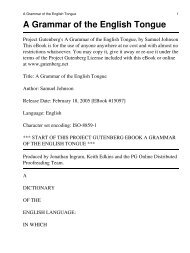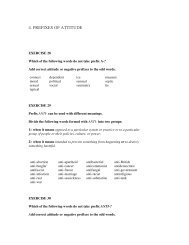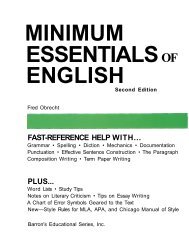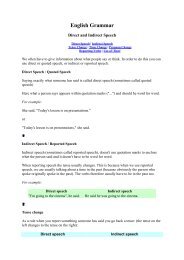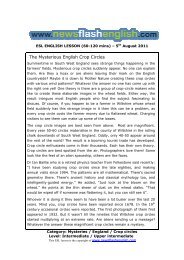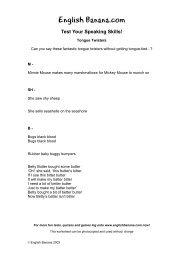English Grammar in Use
English Grammar in Use
English Grammar in Use
Create successful ePaper yourself
Turn your PDF publications into a flip-book with our unique Google optimized e-Paper software.
I will and I’m go<strong>in</strong>g toSue is talk<strong>in</strong>g to Helen:Let’s have a party.That’s a great idea.We’ll <strong>in</strong>vite lots of people.will (’ll): We use will when we decide to dosometh<strong>in</strong>g at the time of speak<strong>in</strong>g. Thespeaker has not decided before. The party isa new idea.decisionnowI’ll …SUELater that day, Helen meets Dave:Sue and I have decided to have a party.We’re go<strong>in</strong>g to <strong>in</strong>vite lots of people.HELENpast now future(be) go<strong>in</strong>g to: We use (be) go<strong>in</strong>g to when wehave already decided to do someth<strong>in</strong>g. Helenhad already decided to <strong>in</strong>vite lots of peoplebefore she spoke to Dave.decisionbeforeI’m go<strong>in</strong>g to …HELENDAVEpast now futureCompare:‘Gary phoned while you were out.’ ‘OK. I’ll call him back.’‘Gary phoned while you were out.’ ‘Yes, I know. I’m go<strong>in</strong>g to call him back.’‘Ann is <strong>in</strong> hospital.’ ‘Oh really? I didn’t know. I’ll go and visit her.’‘Ann is <strong>in</strong> hospital.’ ‘Yes, I know. I’m go<strong>in</strong>g to visit her this even<strong>in</strong>g.’When we say that ‘someth<strong>in</strong>g is go<strong>in</strong>g to happen’,the situation now makes this clear.The man is walk<strong>in</strong>g towards thewall now, so we can see that heis go<strong>in</strong>g to walk <strong>in</strong>to it.go<strong>in</strong>g tosituation nowfuture happen<strong>in</strong>g3




